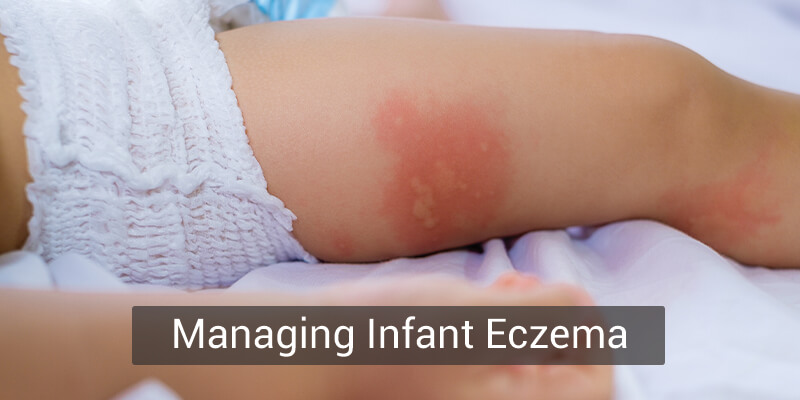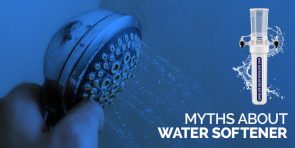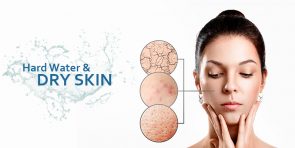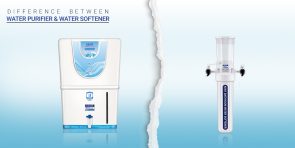Is your Baby’s Eczema or Rashes Due to Hard Water?
Skin rashes are quite common among babies. If your little one suffers from excessive skin rashes, it’s time to get the water quality tested! As a parent, you pay special attention to every product that you use for your babies, but the majority of you ignore the quality of water used on a daily basis. Hard water increases the risk of infant eczema among babies. Most of the parents are unaware of the connection between hard water and baby eczema. In this blog, we discuss in detail how hard water affects your baby’s skin. Read on.
Is it Eczema or Just Rashes?
Parents find it difficult to identify the causes of eczema breakouts as they confuse it with skin rashes. Red, leathery patches on baby’s skin are the first signs of eczema. The common areas where eczema spreads are folds of skin, nappy area and behind the knees, cheeks, neck folds and joints. Eczema makes a baby’s skin extremely dry and sensitive. The skin condition comes and goes with varying severity.
What are the type of eczema?
- Atopic dermatitis: The most common form of eczema, often linked to allergies and asthma.
- Contact dermatitis: Caused by direct contact with irritants or allergens, leading to red, itchy skin.
- Dyshidrotic eczema: Characterized by small blisters on the hands and feet.
- Nummular eczema: Appears as coin-shaped patches of irritated skin.
- Seborrheic dermatitis: Affecting areas rich in oil glands, like the scalp and face.
What Causes Infant Eczema?
The causes of infant eczema are varied. Some of the main causes of eczema in infants are:
- Allergens – Exposure to dust particles such as pollens, air pollutants, mold, pet dander can trigger eczema.
- Water Quality – Hard water, which is high in calcium and magnesium, is another major reason of infant eczema.
- Diet – Certain food items such as oranges, eggs or seafood can lead to eczema. Preservatives used in food or food color can also lead to infant eczema.
- Fabric – Fabrics such as lycra or woolens can lead to skin irritation
- Detergents and Lotions – Harsh chemical components in detergents and lotions also cause eczema.
How is Hard Water the Culprit?
A high percentage of calcium and magnesium in water makes it hard. High levels of calcium and magnesium bind with the chemicals in soap and shampoos to form surfactants, leading to skin build-up. This disturbs the natural balance of bacteria that maintain skin as a natural barrier and leaves baby’s skin prone to damage by harmful bacteria leading to infections.
Are there any Risk Factors?
Many children outgrow the condition, however, some of them may continue having the symptoms of eczema in adulthood. Infant eczema increases the risk of secondary skin infections and is also associated with some other health issues such as asthma, food allergy or allergic rhinitis. Some of the other health issues caused by infant eczema are:
- Chronic itchy and scaly skin
- Skin infections
- Irritant hand dermatitis
- Sleep problems
How Can You Prevent Skin Rashes?
The following baby skin care tips will help in preventing infant eczema:
1. Use a Water Softener
As hard water is one of the main reasons for skin rashes, it is advisable to install a Water Softener to ensure that you use soft water for your baby. The water softener uses an efficient ion exchange process to reduce hardness by exchanging calcium in water with sodium and potassium.
Read More: Rediscover the Joy of Bathing with KENT Bathroom Water Softener
2. Use Mild Toiletries
Unscented and hypoallergic toiletries are the best for your baby. These skin care products will help in soothing itchiness and irritation.
3. Keep Them Moisturized
An important baby skin care tip is to keep your infant’s skin moisturized. Go for a moisturizer with petroleum jelly for best results and make sure you apply the moisture right after bathing the baby.
Infant Eczema is a serious concern for parents. With proper care such as using soft water and using the right products, you can easily keep the condition in control. Before installing a water softener, you can get the water quality tested in your home. To book a free home visit, click here
Frequently Asked Questions
1. What triggers eczema in babies?
Eczema in babies can be triggered by various factors. These include genetics, irritants like harsh soaps, allergens such as dust mites, pet dander, and pollen, dry skin, and temperature changes like cold and dry weather. These triggers can lead to flare-ups and worsen the condition, making it important to take preventive measures for baby’s comfort and well-being.
2. Does breastmilk help eczema?
Breast milk is believed to have potential benefits for eczema in babies due to its natural anti-inflammatory and moisturising properties. Some studies suggest that applying breast milk topically to affected areas may help soothe and improve mild eczema symptoms. However, it may not work for everyone, and it’s essential to consult a paediatrician or dermatologist for a proper eczema management plan for the baby.
3. How I cured my baby’s eczema naturally?
I successfully treated my baby’s eczema using natural methods. I identified triggers, moisturise their skin with gentle creams, used mild products, dressed them in soft fabrics, and used natural remedies like coconut oil and aloe vera. Consulting a paediatrician or dermatologist was essential for personalised guidance.





